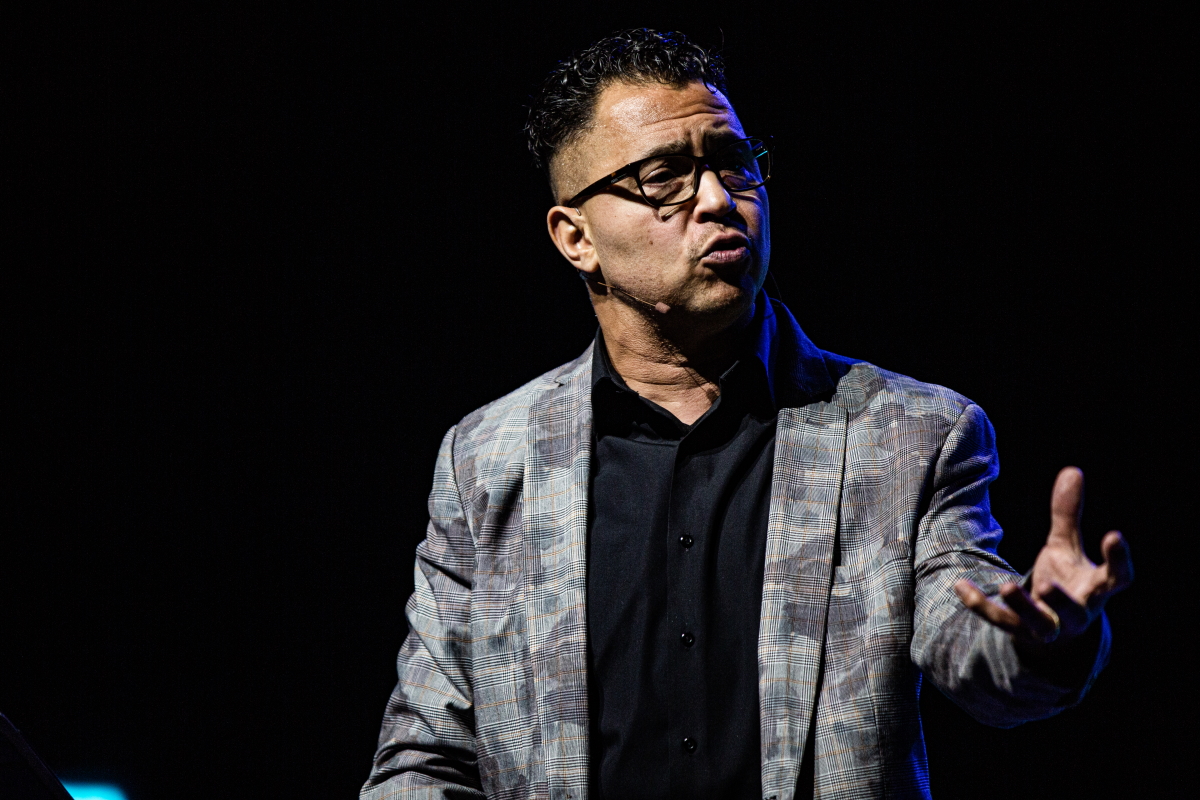
The Whispers of Revival
Video Courtesy of R. York Moore
There is a new movement of God in America. It has come in whispers and rumors but now is beginning to manifest in powerful ways. I first heard the whisper in 2015, while running a nationwide anti-trafficking campaign called the Price of Life. The campaign mobilized hundreds of thousands to fight trafficking, including Fortune 100 companies, US Representatives, and several State Attorney General Offices. I was not looking for a change and felt my ministry was in its prime. However, that year, the Holy Spirit whispered in my ear, ‘revival is coming.’ I knew this whisper meant I needed to stop what I was doing and focus my energy on revival.
My friend Nick Hall, founder and president of the Pulse Movement, and a number of other leaders heard the very same whisper. Nick began to dream and plan for a Gen Z one-day revival on the Washington Mall called Together ‘16, which eventually drew over 300,000 people in June 2016. I joined Nick in this vision, spending nearly a year assisting the development of Together. I was honored to speak about revival, joining the likes of Francis Chan, Lecrae, Kirk Franklin, Ravi Zacharias, Andy Mineo, and Jo Saxton. I was excited to preach on revival in our time — a new normal of spiritual fervency. I was passionate about telling the crowd about a coming breakthrough that would impact not only the lives of Christians but the social structures and institutions of America. It was a dream come true. But then, when I was only eight feet from the podium, I was told I would not go on because Together ‘16 was being canceled due to above-90 degree heat and a potential tornado warning. Nick and the team disbursed the audience with great sorrow. It broke my heart.
I needed to go on a prayer walk to get a fresh word from the Spirit. Immediately, I felt drawn powerfully to a man sitting alone. As we spoke, it was obvious why the Spirit drew us together. He had my same title in Cru and was asking the Holy Spirit to guide him for his next steps as well. Cru (formerly Campus Crusade for Christ) and InterVarsity USA are two of the largest campus ministries in the world but have never been in partnership in their organizational histories. I flew down immediately to meet with Cru leaders with one burning question, ‘What is the one thing we can do together that we could never do apart?’ We prayed on this question for seven months, meeting in various places throughout the country until we all heard the whisper together. Sitting in a hotel in Pennsylvania, after a time of prayer, Bible reading, and listening, we heard the Spirit say, “You need to partner together for the sake of revival.” It was the genesis of what has now become EveryCampus, a massive coalition of over 100 organizations.
The movement that started from a rumor and a whisper is now strong and vibrant. Organizations in EveryCampus are sharing data, creating resources, joining together on platforms at events, wearing each other’s branded shirts, and literally paying for each other’s expenses. It is like nothing I’ve seen in my 25 years of ministry. We worked with a data analytics company called Gloo to create a never-before-possible digital platform to connect these organizations in new and creative ways. And we are working with Barna Research on the largest research project in Barna’s history — the State of the Church, which will include the State of the Campus. EveryCampus has played a key role in helping to gather many organizations together for revival in a time of great disruption. Before the COVID-19 pandemic, we were hoping the whisper of revival was coming true, but now we are certain of it. Revival often comes during times of great societal upheaval and disruption. There is no doubt that we are living in one of the most disruptive times in human history. Never in the history of humanity has the entire globe been on pause at the same time. Pandemics have always occurred, but in our time, the world is connected as one and suffering as one. Gen Z will play the most important role in what comes of the world post-COVID-19. College ministry has always been important, but now, it is even more important than ever before. We need revival in the Church and awakening on our campuses, and the EveryCampus movement, I believe, will play a pivotal role in helping to make that happen. God has prepared unity amongst rivals for such a time as this. Disruption is an opportunity for revival and the ground has been prepared. Through a massive prayer campaign, unprecedented technological coordination, true unity, and collaboration, EveryCampus has created a new normal that can help facilitate the whispers of revival.
In the end, however, it is all about the Church. The vision of EveryCampus is that we are conspiring together to instigate revival by catalyzing prayer and gospel movements on every campus in America. The way EveryCampus seeks to do this is through the Church. EveryCampus is NOT about campus parachurch organizations just doing more of the same. Of the 4,200 campuses in America, only about half have a gospel movement on them. Most of these movements are EveryCampus partners like Chi Alpha, Young Life, Circuit Riders, InterVarsity, Cru, the CCO, Baptist Collegiate Ministries, and others. The same roughly 2,000 campuses have been reached and re-reached for decades, but what about the other half? Down the block from the unreached campuses of America stands a Church of God in Christ local congregation, a Baptist church, an independent church — the hope of revival is in these congregations. Some are small and some are large, but they are already the outposts for a mighty move of God on our college campuses and EveryCampus exists to serve these outposts!
Through our resourcing, coaching, and data, EveryCampus has everything a local congregation needs to reach students by starting new movements on unreached campuses. We’ve painstakingly mapped each and every campus in America, bathing it in prayer for revival and then making it visible on EveryCampus. Churches now can run data reports, see who is doing what and register their work on the site. We don’t know where revival will break out in force in America, but I believe it will come through churches reaching unreached Gen Z students locally. This is the hope of EveryCampus and how we need it!
Pre-COVID-19, we were seeing young people walking away from the Church in unprecedented numbers. The conversion of Kanye West created a moment of wonder and intrigue, however. It seemed like God was doing something new, but we need more than the conversion of a megastar for revival. Even in our Black and Latino communities, where the Church has historically been a bedrock, Gen Z is challenging that role, and the authority church leaders and traditions have in their lives. This time of economic, political, racial, and now health crisis has put on pause a mass exodus from the Church. Gen Z is looking for answers, and many are returning to Jesus. Young people are willing to listen again, but the time to act is now! During COVID-19, we are seeing a surge of interest in online gatherings of young people. By the thousands, and sometimes tens of thousands, young people in America are gathering for online religious events. InterVarsity USA has seen a record number of conversions to Christ in the last few years as well. The signs of hope in reaching Gen Z are all around us, and revival almost always comes during times of disruption. We believe we are living in a new normal in many ways, and the Spirit is at work in these days in power. When the Spirit whispers ‘revival,’ it comes in unexpected ways and produces unexpected results.
About R. York Moore

R. York Moore is an artistically gifted speaker, a revivalist, and an abolitionist. He serves as Executive Director/Catalytic Partnerships and as National Evangelist for InterVarsity Christian Fellowship. R. York is the co-founder of the EveryCampus coalition, a coalition of over 100 organizations, denominations and church networks joined together to seek God for revival on the college campuses of America. He is the author of several books, including “Do Something Beautiful: The Story of Everything and a Guide to Finding Your Place in It,” (Moody Publishers). R. York Moore became a Christian from Atheism while studying philosophy at the University of Michigan. R. York Moore has a degree in Philosophy from the University of Michigan and an MA in Global Leadership from Fuller Theological Seminary. He lives in Michigan with his wife and three children. For more information about R. York Moore, visit TellTheStory.net and follow him on social media channels @yorkmoore.


 What I loved best about Milliken’s memoir, apart from being reintroduced to my father through his eyes, is how he talks about his own lifelong need for healing. Mixed in with stories like Jacqueline Kennedy Onassis arranging an internship for her son John Jr. with his organization are stories of his own brokenness and pursuit of healing. The final chapter has Milliken seeking medical treatment for post-traumatic stress symptoms and severe gastrointestinal distress brought on by decades of overwork in urban ministry. “I’ve spent the last three years trying to lead a more balanced life,” he writes, and then explains that the reason he’s confessing these things is that he wants readers to know that “the healing journey is never finished.” “All my hurting places, limitations, and shames aren’t just distant memories. They’re still with me, still clearly visible,” he says.
What I loved best about Milliken’s memoir, apart from being reintroduced to my father through his eyes, is how he talks about his own lifelong need for healing. Mixed in with stories like Jacqueline Kennedy Onassis arranging an internship for her son John Jr. with his organization are stories of his own brokenness and pursuit of healing. The final chapter has Milliken seeking medical treatment for post-traumatic stress symptoms and severe gastrointestinal distress brought on by decades of overwork in urban ministry. “I’ve spent the last three years trying to lead a more balanced life,” he writes, and then explains that the reason he’s confessing these things is that he wants readers to know that “the healing journey is never finished.” “All my hurting places, limitations, and shames aren’t just distant memories. They’re still with me, still clearly visible,” he says.